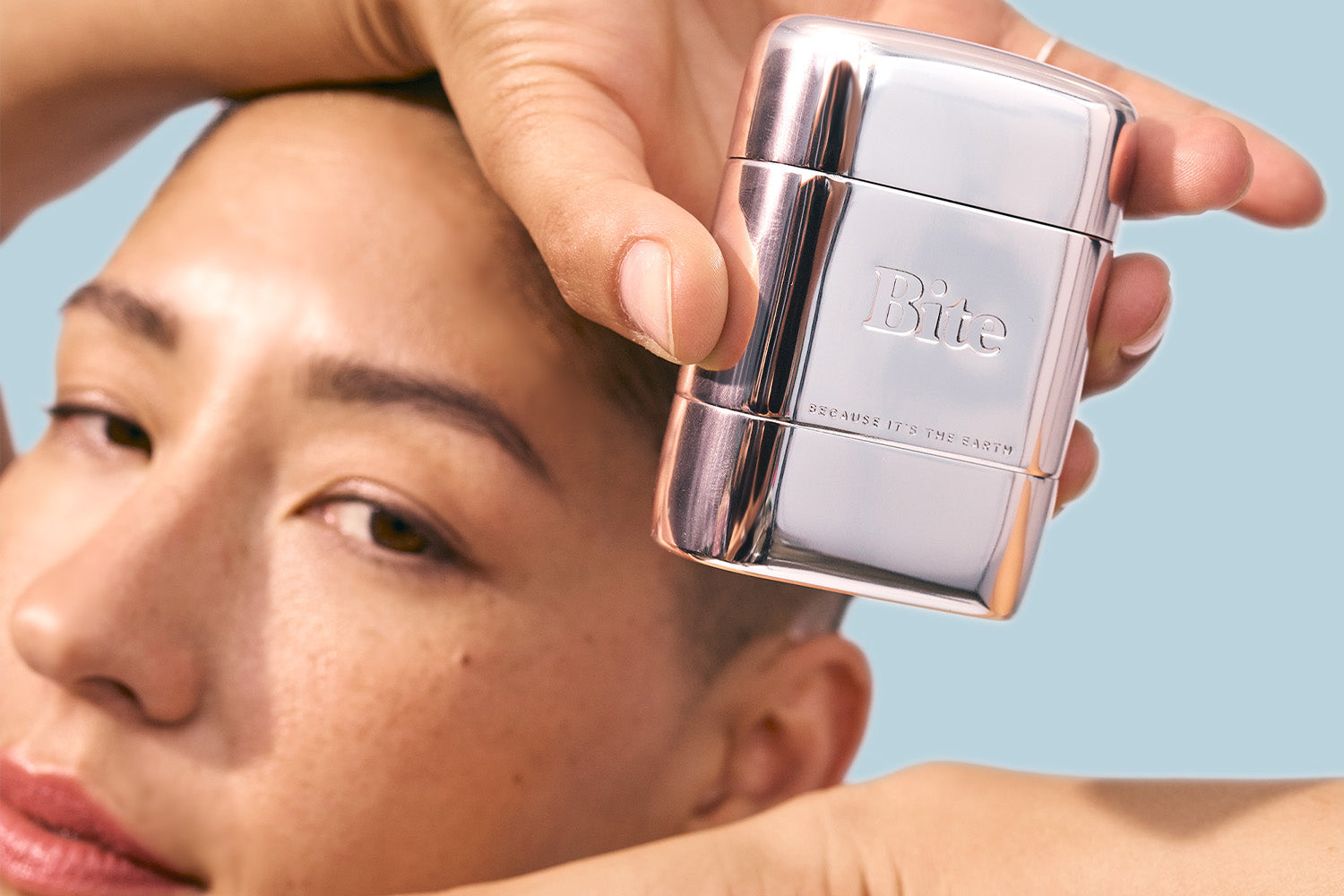Castor Seed Oil: Seven Benefits for the Skin
Some hair care enthusiasts may be familiar with castor seed oil’s glowing rep for hair support (and that rep is well deserved), but did you know using this moisturizing oil on your skin comes with its own long list of benefits?
While castor oil may not be as well known for skincare as some other fan favorites like coconut oil and rosehip seed oil, we are here to shine a spotlight on castor seeds because – wow – this oil can just about do it all.
And don’t just take our word for it! Castor seed oil has been used for thousands of years, dating back to Ancient Egypt, where it was used for medicinal and beauty purposes.
What Is Castor Seed Oil?
Castor seed oil is a type of lipid (or fat) known as a triglyceride. This fatty oil comes from — you got it — the seed of the castor plant (Ricinus communis). The seeds, also referred to as castor beans, are rich in thick oil, which is extracted to produce castor seed oil.
The castor beans are cold-pressed to produce castor seed oil, and then the oil is heated. While raw castor seeds contain a toxic enzyme known as ricin, the separating and heating of the oil destroys this toxin, making this nourishing plant compound safe and gentle on our skin.
The castor plant is a tropical plant native to the Mediterranean and tropical regions of Africa and India. India is currently the largest producer of this well-loved vegetable oil.
While castor seed oil has served many purposes throughout history – including being used in paints, as a laxative, and even to help induce labor in pregnant women – its most common use today is in natural hair care, skincare, and even perfumes.
What Are the Benefits of Castor Seed Oil?
Castor oil contains a high concentration of ricinoleic acid, along with oleic acid, linoleic acid (an Omega-6), α-linolenic acid (an Omega-3 fatty acid), stearic acid, and palmitic acid.
What really sets castor oil apart is that the content of its chemical structure contains over 85% ricinoleic acid, which is an extremely rare find in natural substances.
When used in personal care products, the ricinoleic acid works in harmony with the other fatty acids found in castor oil to provide a number of skin-supporting benefits.
1. Moisturizes the Skin
Castor seed oil contains fatty acids that can provide soothing hydration for the skin. Ricinoleic acid in particular serves as a humectant, locking moisture into the skin.
By preventing water loss through the outermost layer of skin, castor seed oil can help keep your skin hydrated and soft.
While castor oil is thick in consistency on its own, it is most commonly mixed with other ingredients to create an appealing consistency that can soften and hydrate the skin.
At Bite, we pair castor seed oil with nourishing shea butter, rosehip oil, and hyaluronic acid in our Body Balm to create a smooth, nongreasy moisturizer that will feel great on your skin.
The adhesive nature of castor seed oil also helps it stick to the skin to provide longer-lasting benefits, which is one of the reasons it makes such a wonderful addition to our deodorants, too!
2. Protective Agent for Skin Barrier
Our skin barrier – the outermost layer of skin – is vital for protecting our skin and keeping any irritants or invaders out. Our skin barrier protects us from bacteria, pollution, and other foreign objects that could cause internal harm. So, it’s no surprise that maintaining the health and effectiveness of our skin barrier is key.
Unfortunately, our skin barrier can become less effective when it is dry and irritated, as it becomes more prone to damage and breaks.
But, the good news is that rehydrating dry skin can help support the skin barrier, which in turn works to protect your skin and seal in moisture.
Castor oil can provide this support, as its fatty acids help hydrate and strengthen skin cells. The omega fatty acids found in castor oil are particularly beneficial in building up skin cells to bolster the protective barrier.
3. Can Help Reduce Swelling
Along with providing nourishing hydration, the ricinoleic acid content in castor oil can help reduce swelling and ease discomfort when used on the skin. The linoleic acid found in castor seed oil is also known to limit swelling.
By helping soothe irritation and calm the skin, scientific evidence suggests that castor seed oil can serve as a natural ingredient to smooth the skin and provide relief.
4. Can Help Reduce Appearance of Scars
Castor oil’s ability to hydrate and smooth out skin can also prove beneficial to anyone hoping to reduce the appearance of scars or blemishes.
Because the fatty acids in castor seed oil can support the hydration and health of skin cells, the regular use of castor oil may support smoother, younger-looking skin and even tone.
The fatty acids in castor oil may help reduce the appearance of scars, blemishes, and dark spots by smoothing out the skin.
5. Can Help Support Facial Skin
Castor seed oil's gentle nature can make this oil an ideal addition to your face care routine.
Ricinoleic acid’s skin protective properties may help keep out bacteria that can lead to blemishes, while the other fatty acids can elevate the smoothness and softness of our facial skin. Castor oil also has a lower comedogenic score, meaning it is less likely to clog the pores.
6. Reduced Appearance of Fine Lines
Alright, so we know that castor oil can help hydrate the skin, but did you know that the benefits of adequately hydrated skin go beyond reducing irritation and dryness?
Well-moisturized skin can also do wonders for reducing wrinkles, fine lines, and other signs of aging that some of us are hoping to hold off on for a few more years, at least!
By maintaining moisture within skin cells, castor seed oil can help support skin elasticity and firmness, which can reduce the appearance of wrinkles and lines.
The hydrating nature of castor seed oil may even support normal levels of the protein collagen by keeping it sealed in, which helps maintain skin elasticity. By nurturing the skin, castor seed oil can help rejuvenate the skin, keeping it young and soft.
Are There Any Side Effects of Castor Seed Oil?
Castor seed oil is extremely safe, especially when applied topically.
While castor seed oil is FDA-approved as a laxative, some risks are associated with ingesting castor oil. Consuming too much castor seed oil can lead to nausea, cramping, and electrolyte imbalances.
You should also never consume castor seed oil if pregnant. You should always speak to a healthcare professional before consuming any type of castor seed oil or supplement and can also check in with your doctor if you have any questions about using the oil topically.
There is little risk of using castor oil on the skin, especially when diluted with other ingredients such as jojoba, coconut, or rosehip oil. However, allergic reactions such as rashes or irritation are possible, so it is best to test castor oil on a small area of skin before adding it to your routine to see how your skin reacts.
How Bite Uses Castor Seed Oil
At Bite, we can’t get enough of this natural, hydrating ingredient.
Along with providing soothing skin support, the unique makeup of ricinoleic acid also makes castor seed oil an ideal alternative for petroleum-based plastics. Castor seed oil is biodegradable, non-toxic, and doesn’t require any fossil fuels, making it safe for our atmosphere, oceans, and us.
That’s why castor oil is a key ingredient in both our Body Balm and our natural, aluminum-free Deodorant.
And you’ll even find castor seed oil making an appearance as the bristles of our toothbrushes!
Forming the bristles of our Bamboo Toothbrush with castor seed oil means our toothbrush is completely plastic-free (as all of our products are!) and biodegradable.
Bottom Line
Castor seed oil can be found in a wide range of wellness products such as creams, lotions, balms, and hair care products meant to prevent hair loss, support healthy hair growth, and reduce dandruff.
When used in skincare products, the fatty acids found in castor oil help hydrate the skin, protect the skin barrier, provide antibacterial properties, reduce signs of aging, and promote overall skin health.
Here at Bite, we love using castor seed oil as a natural, biodegradable, and ethically sourced ingredient that is just as good for the planet as it is for your skin!
Sources
Chemical Derivatization of Castor Oil and Their Industrial Utilization | ScienceDirect



